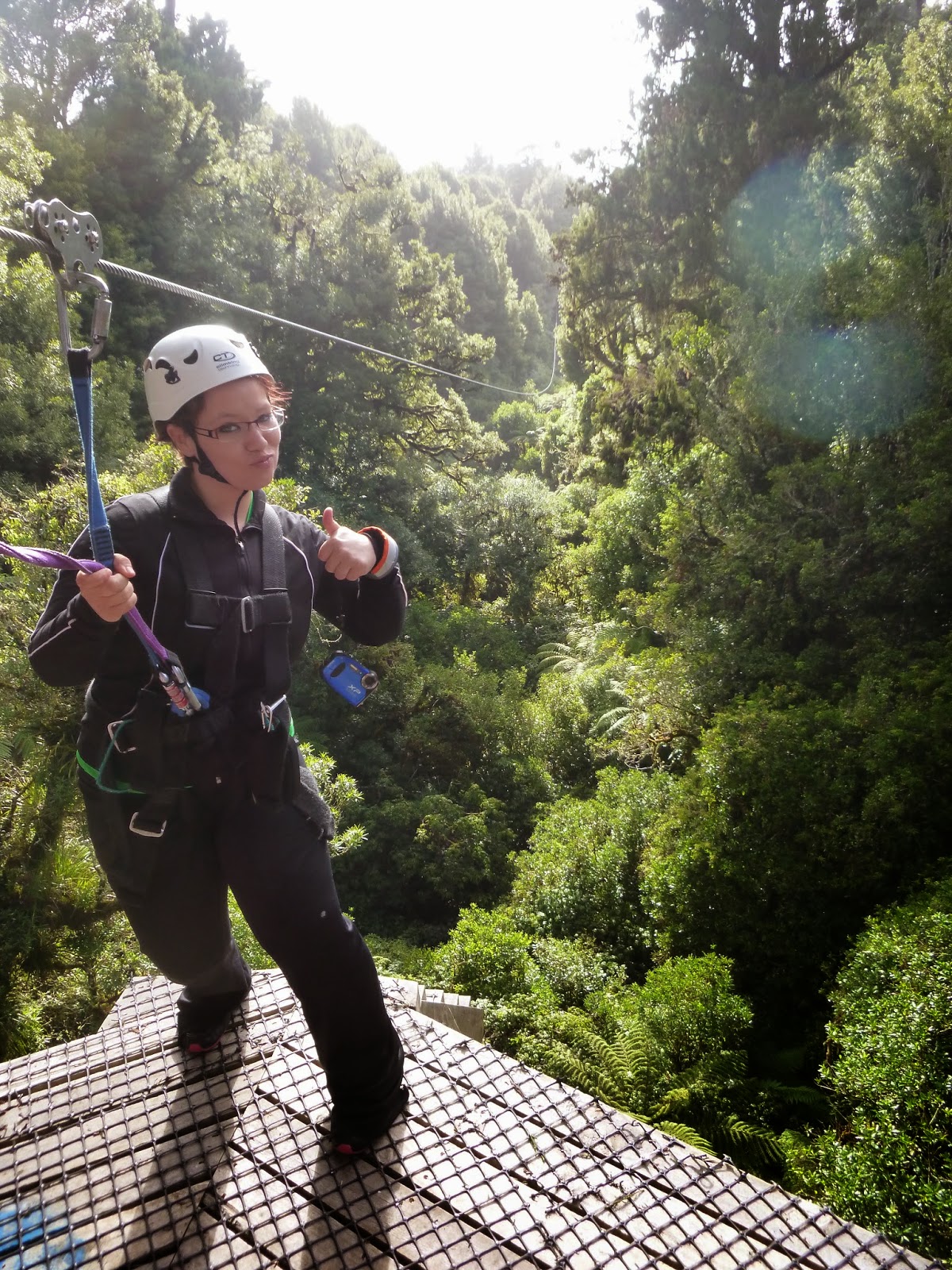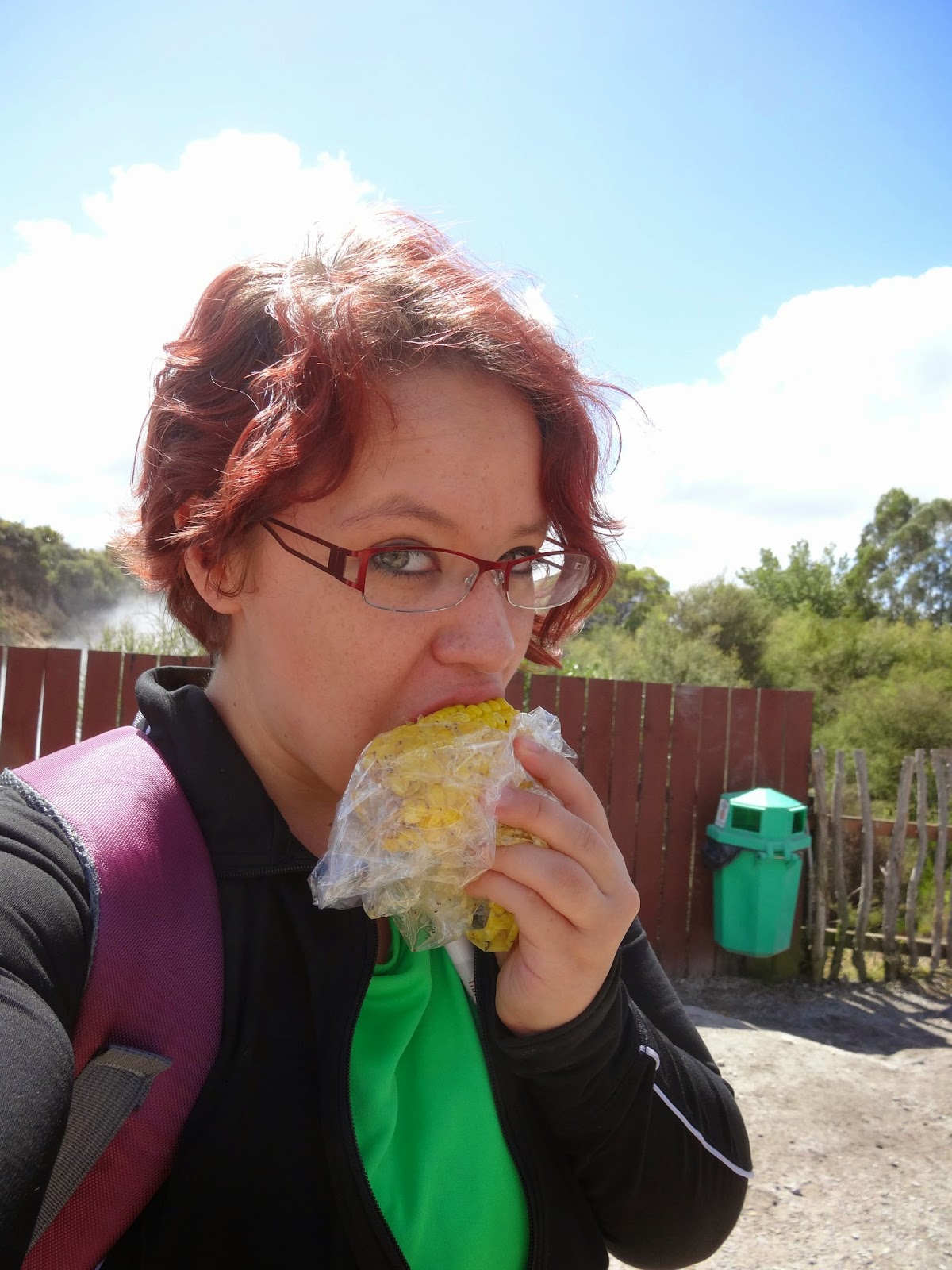We spent the evening in Rotorua at Rock Solid Backpackers. I
found this hostel on Hostelworld.com which has always been a very reliable
source. They had a 98% rating at the time I looked them up and it cost us about
NZ$19 each to stay in a 4-bed female dorm room. I have to say I was really
impressed by their accommodations.
I also felt very secure in their
facility. They had a lounge area that was open to anyone with a pool table, TV,
free movies, a book exchange and couches to hang around on. However, to get up
to where the living areas were you had to open one door with a code then a
second door with a key and then finally your bedroom door with a second key. In
addition, they had strict policies that only paying guests were allowed
anywhere up in the living area. Honestly, I've been fine in hostels with far
less security, so I was confident that my stuff was safe at Rock Solid.
We woke up bright and early the
next morning to continue our adventures in Rotorua. For our second day we
decided to do some nature and culture touring. In the morning we went out for
an adventure with the Rotorua Canopy Tours company, and in the afternoon we
spent a few hours exploring the Whakarewarewa Maori village.
Rotorua Canopy Tour
Sunday morning we were picked up outside our hostel by the
large white Rotorua Canopy Tours van. As I stepped inside to find a seat I was
greeted by our tour host for the day and 4 other guests that would be coming
along with us.
The van took us to the RCT main building where we met
another 4 guests to make a total of 10 people in our touring group. What were we
signing up for you may ask? Well maybe this picture will give you a clue...
If you didn't guess from the picture, Rotorua Canopy Tours
is a company that takes groups of people out for a zip lining tour through the
treetops in the nearby Dansey Road Scenic Reserve. It is one of the last
remaining untouched forests left in New Zealand and RTC has been raising money
through their canopy tours to aid in their conservation efforts.
We started the tour by getting set up in our harnesses and
helmets and then hopping in the van for the 20 minutes ride to the reserve. As
soon as I stepped out the van and turned towards the forest, I was greeted by a
huge thick wall of green.
A small path snaked away from the road into the dense foliage. The air was thick with the musty smell of forest and plant life. As we walked along the path, we were surrounding by huge thick trees rising into the sky and creating a dense canopy above while ferns and palms filled the gaps at the forest floor. Our tour guides informed us that this was one of the only forests on NZ with untouched trees. Most other forests had been cut down long ago and replanted later. Some of the trees we walked by were hundreds of years old.
A small path snaked away from the road into the dense foliage. The air was thick with the musty smell of forest and plant life. As we walked along the path, we were surrounding by huge thick trees rising into the sky and creating a dense canopy above while ferns and palms filled the gaps at the forest floor. Our tour guides informed us that this was one of the only forests on NZ with untouched trees. Most other forests had been cut down long ago and replanted later. Some of the trees we walked by were hundreds of years old.
Surprisingly, the forest was actually pretty quiet. As I
later learned, before people started arriving on New Zealand it was an island
almost entirely composed of birds and reptiles; there were no native land
mammals. Therefore, many of the native New Zealand birds had not evolved the
usual defenses against those types of creature. In fact a large percentage of
their natural birds were flightless and lived in burrows in the ground. When
people started coming over however, they brought many land mammals with them
such as rats and possums. These animals quickly decimated the native bird
population and caused many species to go extinct. The Dansey Reserve is one of
the few places where they are attempting to revitalize that population, but
there are still shockingly few birds given how big the reserve is, so the
normal forest noises you might expect to hear are often absent.
Soon we reached the first platform on our journey. There
they gave us a rundown of the safety procedures. There were ten platforms total
throughout the tour with 7 zip lines and 2 bridges to cross.
One of the tour
guides was always in front of the group to help each person onto the platforms
and one was at the back of the group to hook you on to the line and make sure
everyone got across.
It was a beautiful and exciting journey through the tree
tops. The harness hooked you to the rollers on the group using two thick ropes.
Other than those points of contact you were free to swing your arms and legs
freely as you flew through the canopy.
The highest platform was about 70 feet
off the ground and the longest zip line was 220 meters.
The whole tour took about 3 hours. It was extraordinarily beautiful and very exciting. I was able to get some really gorgeous photos and even got to see a couple New Zealand Silver Ferns which stand as the national symbol.
Nothing like swinging through the treetops to bring a bunch
of strangers together!
Whakarewarewa
After being driven back to our hostel we had a quick stop
for lunch at The Brew café and bar (where I had a delicious BLT and chips)
before catching the #2 bus out to our next stop for the day. Getting off the
bus we had to walk about two blocks before arriving outside the gates of the
Whakarewarewa Maori village.
It doesn't look like much from the outside, but as you cross
the first bridge into the village you will quickly notice that it is very
different than the usual tourist stop. A group gathers at the edge of the
bridge with a tour guide to take you around the village. You don’t have to go
with the tour, but I would recommend it as it is the only way to really
understand the history and importance of the area.
Crossing the
bridge you can instantly see that you are standing on top of an active
geothermal area. Large steam clouds rise from hot bubbling pools just on the
village’s edge.
Old worn houses are perched just feet from the hot pool which are fenced off for safety.
Old worn houses are perched just feet from the hot pool which are fenced off for safety.
The tour guide took us through the different hot pool and
explained their history with the village. Whakarewarewa calls itself a living
Maori village. As the tour guide explains all of the people in the village
actually live there and use the natural resources, and many of them work during
the day in normal jobs and careers in Rotorua. Every house in the village is
owned by a family who can trace their lineage back to the original tribe.
Perhaps one of the neatest things to witness in the village
is the fascinating blend of traditional and modern. The villagers love to
continue to use the natural resources of the geothermal area they sit stop. The
tour guide showed us how they use wooden boxes over hot steam vents to cook
their meat...
and can boil various vegetable in the hot pools.
I even got to try some of the delicious corn they boiled in the hot pools right before my eyes.
and can boil various vegetable in the hot pools.
I even got to try some of the delicious corn they boiled in the hot pools right before my eyes.
In addition they will siphon off water from the pools into
large concrete holes that they use for bathing. The minerals in the water are
supposed to be very good for the skin and health and the villagers use the natural
baths often and regularly.
Very few people need to pay for heating or appliances because they have the natural heat from the Earth for free.
Very few people need to pay for heating or appliances because they have the natural heat from the Earth for free.
Yet, the villagers still work normal jobs, drive cars, watch
TV and do other modern everyday things. I love and recognize the beauty in how
they've chosen to live their lives. They keep their heritage, speak the Maori
language and use the resources at their fingertips, but still take advantage of
the conveniences of the normal world. I think it is inspiring to see people who
recognize that being modern doesn't mean you have to give up the uses of the
world around you.
After the tour, we continued to explore different parts of the village. Everywhere we had the chance to see the signs of the slow moving Earth beneath us.
A bubbling hot mud pool that we found just to the side of one of the houses.
It may not look it, but the water in this lake is actually boiling hot!
The brief eruption of a geyser just off of the Whakarewarewa village borders.

















No comments:
Post a Comment